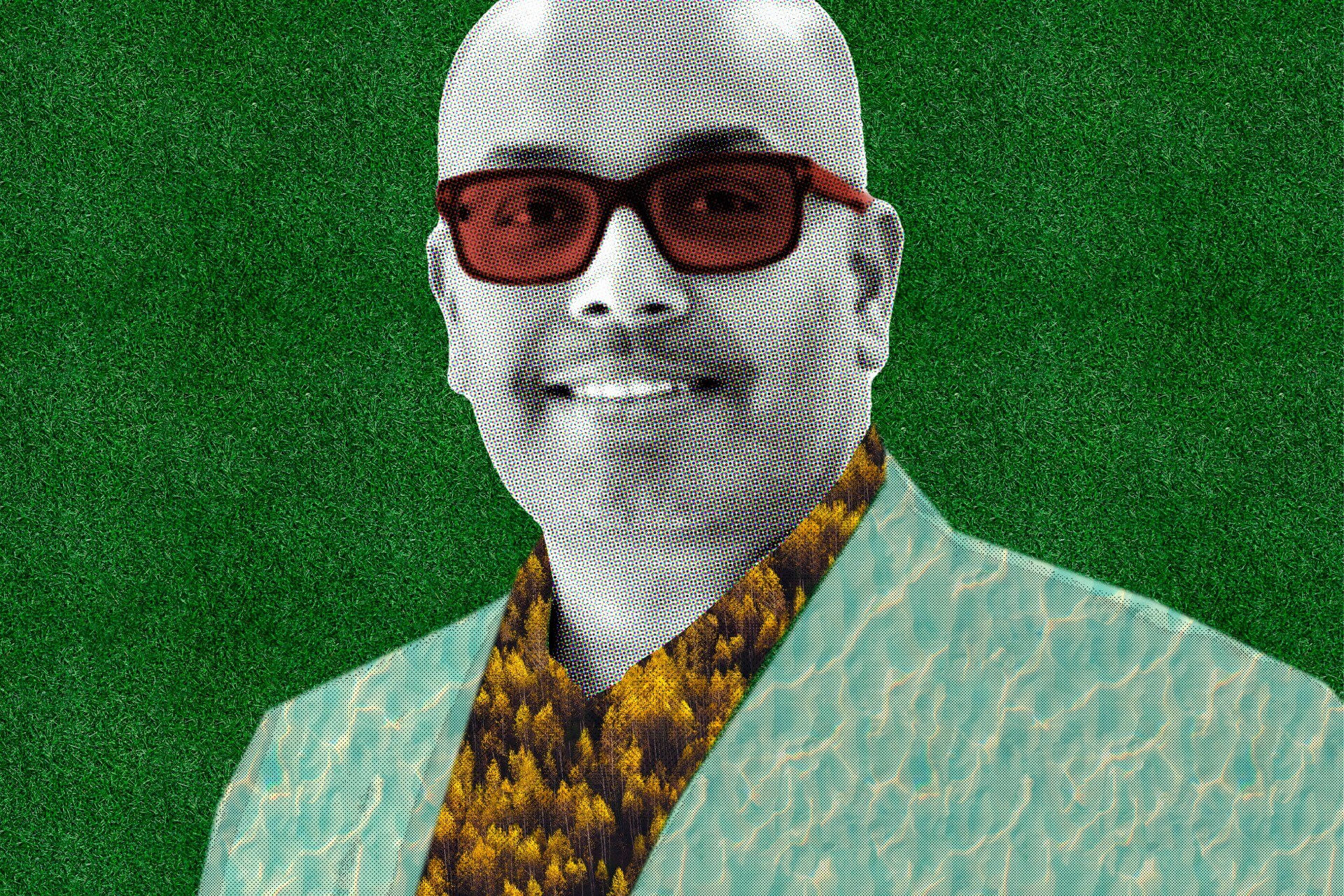Aug 29, 2023 Fashion
To exist in the fashion world, you need at least one of three things: style, connections or money. Canada-based New Zealand business man Feroz Ali has one of them. While he openly shares that he’s “not a fashionista” (a term, self-evidently, only a non-fashionista would use), the entrepreneur is certainly bankrolling fashion. In 2021, he bought New Zealand Fashion Week.
When I call Ali over Zoom, he answers from Vancouver, where he lives with his wife and two children. We start conversationally, with Ali open-faced, affable and curious. After a few minutes, he politely brings us back to business: “We’ve got 60 minutes set aside this afternoon, so is there anything in particular you’d like to achieve?” he asks. We start with the obvious: New Zealand Fashion Week’s hiatus.
The event faced Covid disruptions for three years — in 2020 and 2021 it was postponed, then in 2022 it was cancelled — so the 2023 fashion week set for August will be the first since 2019. Ali expresses genuine enthusiasm for its return. “There’s a sense of excitement, elatement and nerves,” says the 50-year-old, smiling. “We’re just very excited to bring this amazing platform back to New Zealand and the industry.”
Not only will fashion week have a new owner, but it also has a new general manager at the helm. Yasmin Farry, who’s served as a runway producer at the event since its inception in 2001, has taken on the role, replacing founder Dame Pieter Stewart. Ali is quick to direct credit to the right people, and Farry is someone he both trusts and admires. “I didn’t need to give Yasmin any direction — she’s just running straight to the goalpost,” he says. “When you find the right people, your life is easy.”
Ali’s purchase of New Zealand fashion’s pinnacle event might seem completely random, but it’s aligned with his business portfolio of recent years. As part of his education industry investment company, Asia Pacific Education Group, he acquired art, design and fashion school Whitecliffe College, an apt addition to his array of education investments. It saw him rubbing shoulders with fashion folk, and at an end-of-year graduation show one year, he met Stewart. “We stayed in touch and when the opportunity presented itself, I wondered if it would be a good fit. We are the largest fashion school in New Zealand, so I thought, ‘Yeah, I do see a marriage here’. We’d be exposing our students to the industry. Why not?”
The price Ali paid for purchasing New Zealand Fashion Week is undisclosed, but he tells me he didn’t buy the event to make big bucks, but for the positive impact it would have on the industry. “Is it about money? No. It’s about reviving New Zealand Fashion Week’s DNA, celebrating the past successes, while also making sure it is sustainable in terms of its longevity,” he says. Call me cynical, but I’m doubtful Ali’s aims are wholly altruistic. While the outcome for the industry is the same either way — fashion week is back, which is a win — it’s clear that the opportunity to oversee the country’s biggest celebration of fashion makes financial sense for a man who owns the country’s largest fashion school.
I put this to Ali, that by owning New Zealand Fashion Week he’s also helping Whitecliffe stay profitable. He reiterates: “You know what? It benefits my students. It doesn’t benefit me personally. This is probably one of the non-traditional businesses we’ve bought where we didn’t quite look at the profit and loss statements. Yasmin’s remit is ‘Make it work so that it breaks even and is sustainable going forward’.”
Ali was born in Fiji, grew up in Papatoetoe in an “education household” (his parents were teachers) and then joined his dad’s school business after a few years in banking. Here, he found his passion. His career has been spent acquiring, merging and reinventing businesses, largely in the education sector. Talking about education is where he lights up. On a recent trip to New Zealand, he tells me, he walked through the fine arts department at Whitecliffe and spent time looking at students’ work. “They weren’t bound by any boundaries,” he says. “Their whole creativity was unleashed, and I really, really enjoy that. People can express themselves however they want. We have no view on what someone should be and we don’t teach people a certain way of behaving.”
Though he’s exploring the art world only slowly, Ali is keen to understand it better. “As I spend more time in the creative sector — whether it’s through Whitecliffe arts, design and innovation, or fashion — obviously my knowledge and acumen are growing. There is a fascination there,” he says. I ask about Auckland Council’s $35 million cut to arts funding in the proposed 2023/2024 budget, and how it makes him feel. [Auckland mayor Wayne Brown has since shared that he intends to soften the proposed cuts, but as of writing, the budget is yet to be released.]
Ali answers the question carefully, first acknowledging Auckland Council and Tātaki Auckland Unlimited’s support for New Zealand Fashion Week. Then, more frankly: “There are a lot of things wrong in society. Just like you and me, India, we need X amount of dollars every month so we can pay our rent or mortgages or whatever it is we have to pay for and feed your family and friends or whatever your situation is,” he says. “Is it bad they’re cutting things? Yeah. I mean, could they cut 80 or 100 jobs to pay $35 million? I suppose they could. My commercial background says that perhaps fiscal prudence is directing them in making these harsh decisions, but hopefully they can return to a point where this is not totally gone and they can bring these things back in some form.”
Ali’s pragmatism could bode well for New Zealand Fashion Week, and he indicates he’s in it for the long haul. “I’m here to build a legacy,” he says. “I’m very fortunate; I’ve actually bought a lot of businesses from women entrepreneurs and I hope that I do their business justice going forward, because that’s my passion.” I ask why he’s still so interested in New Zealand businesses, seeing as he now lives in another country. “Well, my mum, my brother, my sister, my entire friend network is in New Zealand,” he explains. “Having lived outside of New Zealand, I’m able to take an external perspective, a much more global perspective, and really have an impact on our New Zealand businesses.”
He uses the ASB Classic tennis tournament as an example of how a small event can become an international affair. It’s what he hopes to do with fashion week — he won’t be buying other fashion weeks, he says, but intends for New Zealand Fashion Week to become internationally appealing. “I’m looking at a long horizon. It’s about making sure the future generations of people connected with this industry, both internal and external, have this platform to come out and celebrate and use it as a launching pad for becoming the next amazing designer or collaborator in New Zealand.” He adds that he was in London recently and felt a sense of pride as he walked by New Zealand designer Emilia Wickstead’s store. “When you see Kiwi designers like Emilia based in London’s prestigious Sloane St doing so well, it should inspire other New Zealand designers to try to do the same.”
Another new element for fashion week is introducing meaningful conversations with mana whenua. “You’ve got to first and foremost acknowledge where you are,” says Ali. “Our guiding principle is the Treaty of Waitangi. My whole thing is about inclusivity, and we are operating in their land.” In Farry’s official statement for New Zealand Fashion Week, she echoes this sentiment: “We are tremendously excited to be building a sustainable and long-term partnership with mana whenua, Ngāti Whātua Ōrākei. The development of a partnership built on reciprocity, presents an opportunity for New Zealand Fashion Week to evolve our cultural identity, to build our cultural competency and ensure the indigenous Māori voice is amplified throughout New Zealand Fashion Week.”
These meaningful conversations extend to the entire fashion week ecosystem. The business handover has seen the event democratised somewhat. “One of the things we did consciously was listen to every part of the industry, from the staging company to the producers to the pattern makers and all the way to our top designers,” says Ali. “We were floating some ambitious ideas and gave them a remit to reimagine fashion week. Part of that reimagination is listening to people both internal and external. We wanted to make it more consumer-friendly, so we’re opening it up.” By ‘opening it up’, Ali means there’ll be more opportunities for the public to attend. This public, in all likelihood, will be brimming with influencers — so it’s a smart publicity move when you consider the social media opportunities.
Come August, Ali will be back in New Zealand to show his support. As he sees it, though, the event is for the industry, not for him. “For now I just think I am the current caretaker of this event, not the owner,” he says. “That’s how I and everyone involved in it should see it. We’re trying our best to make sure this event is fair, equitable, transparent and open and so that whatever you want to celebrate can be celebrated.”
Regarding the hiatus, he doesn’t think it will be a problem. “If you’ve got a good product, it can go into hibernation for a while. That’s one of the lessons out of Covid: that a big event like fashion week can go into hibernation and then come back with a bang and be a platform where we’re celebrating the past, the present, and the future. I’m pretty optimistic. I’ll be there with bells on.”
New Zealand Fashion Week is at the Viaduct Events Centre, 29 August to 2 September 2023.
–






